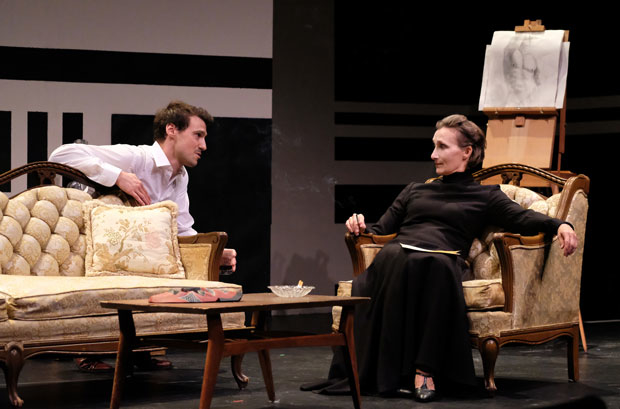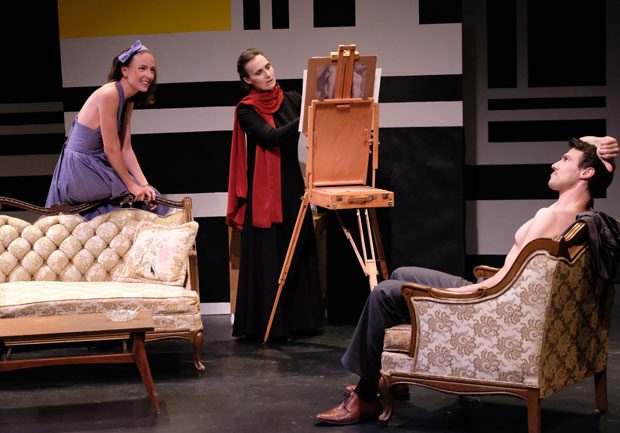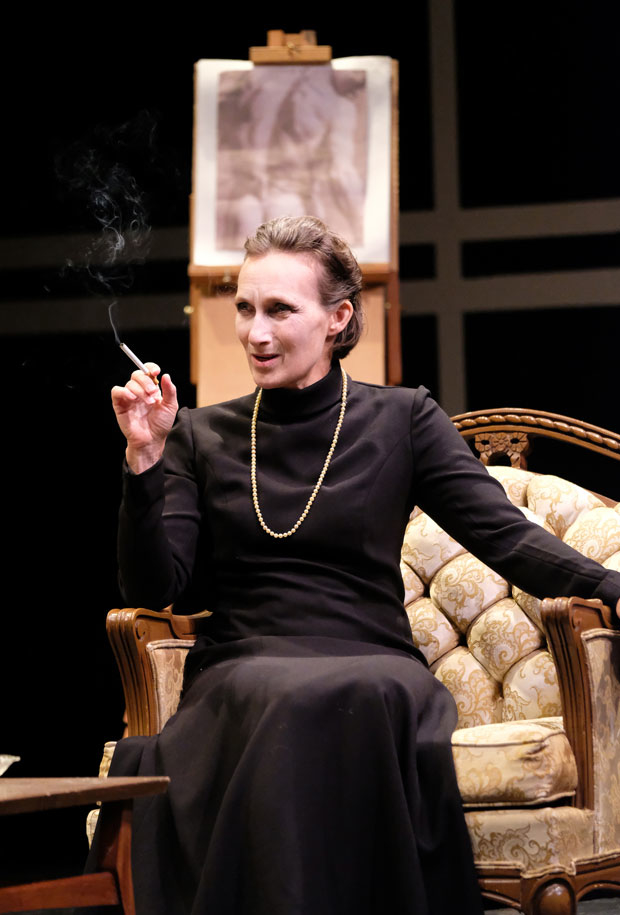The Baroness: Isak Dinesen's Final Affair

(© Ellinor DiLorenzo)
From the moment Dee Pelletier strides onto the stage in The Baroness: Isak Dinesen's Final Affair, one immediately senses a tingling of electricity in the air. With an emanating mixture of mystery, passion, and slow-burning sensuality, Pelletier plays the eponymous 62-year-old Dinesen, née Karen Blixen, the Danish writer best known for her memoir Out of Africa and the short story Babette's Feast (both of which were turned into movie adaptations). It's easy to see what captivates Thorkild Bjørnvig (Conrad Ardelius), a 29-year-old poet Blixen takes under her wing in order to unleash the inner artist in him, his imagination having been dulled, so she believes, by the domestic life he has recently undertaken with his wife and son.
The pair's real-life complex relationship, which spanned the years 1948-55, is the focus of Thor Bjørn Krebs's 2011 play, which the Scandinavian American Theater Company has now brought to the U.S. in a production of Kim Dambæk's English translation directed by the company's cofounder, Henning Hegland. The Baroness presents Blixen through Bjørnvig's perspective, and thus Krebs's play is in part the chronicle of a young artist being guided to cast off the shackles of his bourgeois existence and tap into his adventurous and irrational side. Blixen doesn't just encourage Bjørnvig to cut loose intellectually but also physically: She beckons him to break away from his family and friends, and even subtly tries to guide him to infidelity, in order for him to achieve a sense of complete creative freedom.
No doubt there's a certain romantically idealistic appeal to Blixen's drastic prescription for awakening Bjørnvig's muse, especially when coming from a figure as vibrant and spirited as Blixen. But The Baroness gradually reveals some ambiguities behind her mystical philosophizing. A third character, Benedicte (Vanessa Johansson) — the wife of one of Bjørnvig's literary colleagues — cautions Bjørnvig about how Blixen has seduced other artists before him. Even Blixen herself casts some doubt on her own sanity when she tells Bjørnvig about her decades-long affliction with syphilis, which she fancifully says led her to make a pact with Lucifer, whom she sees as a kindred misfit spirit.

(© Ellinor DiLorenzo)
If the lengthy first act details the honeymoon period between Blixen and Bjørnvig, the much shorter Act 2 plays, by comparison, as a splash of cold water to the face. Perhaps the sense of deflation this section engenders is deliberate, with Blixen occasionally contradicting herself in ways that negate some of her counsel beforehand and Bjørnvig revealing an unwillingness to follow Blixen to the extremes she suggests. But this second act also doubles down on the less interesting angle of Krebs's drama — the friendship-verging-on-romance between these two artists — in ways that make its ending play as more of an exhausted shrug than a satisfying, if tragic, conclusion.
There is also the matter of Akiko Nishijima Rotch's distracting set. In contrast to Stine Martinsen's period-appropriate costumes, Rotch creates a grid-like backdrop of vertical and horizontal lines that recalls a Piet Mondrian canvas, especially when Bjørnvig strips off bits from the set to reveal rectangles of red, yellow, and blue underneath. While intellectual justifications could be made for the visual abstraction, this is still one aspect of Hegland's direction that feels too clever by half, with the backdrop acting as a diversion from the riveting drama onstage.
And the drama, for the most part, is riveting, especially with Pelletier commanding our attention as Blixen. It's her uncanny ability to convey an underlying melancholy, even during her moments of whimsical flights of mystical fancy, that is especially affecting. As Bjørnvig, Conrad Ardelius can't help but seem bland by comparison, though that may be the point: Whatever Blixen saw in Bjørnvig's earlier poetry, he's too conventional in his thinking to become quite the great artist she believes he can be. But The Baroness is, in the end, Pelletier's show. As a character study of an irresistibly eccentric and elusive artist, The Baroness leaves a lasting impression long after the details of this particular affair have dissolved.

(© Ellinor DiLorenzo)










